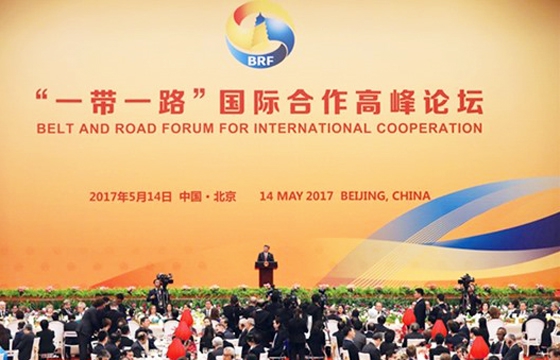Chinese President Xi Jinping pledged $124 billion on Sunday for his new Silk Road plan to forge a path of peace, inclusiveness and free trade, and called for the abandonment of old models based on rivalry and diplomatic power games.
Xi used a summit on the initiative, attended by leaders and top officials from around the world, to bolster China's global leadership ambitions as U.S. President Donald Trump promotes "America First" and questions existing global free trade deals.
"We should build an open platform of cooperation and uphold and grow an open world economy," Xi told the opening of the two-day gathering in Beijing.
China has touted what it formally calls the Belt and Road initiative as a new way to boost global development since Xi unveiled the plan in 2013, aiming to expand links between Asia, Africa, Europe and beyond underpinned by billions of dollars in infrastructure investment.
Xi said the world must create conditions that promote open development and encourage the building of systems of "fair, reasonable and transparent global trade and investment rules".
Hours before the summit opened, North Korea launched another ballistic missile, further testing the patience of China, its chief ally. The United States had complained to China on Friday over the inclusion of a North Korean delegation at the event.
Massive Funding Boost
Xi pledged a major funding boost to the new Silk Road, including an extra 100 billion yuan ($14.50 billion) into the existing Silk Road Fund, 380 billion yuan in loans from two policy banks and 60 billion yuan in aid to developing countries and international bodies in countries along the new trade routes.
In addition, Xi said China would encourage financial institutions to expand their overseas yuan fund businesses to the tune of 300 billion yuan.
Xi did not give a time frame for the new loans, aid and funding pledged on Sunday.
Leaders from 29 countries attended the forum, as well as the heads of the United Nations, International Monetary Fund and World Bank.
Britain's finance minister told the summit his country was a "natural partner" in the new Silk Road, while the prime minister of Pakistan, Nawaz Sharif, a close Chinese ally, praised China's "vision and ingenuity".
"Such a broad sweep and scale of interlocking economic partnerships and investments is unprecedented in history," Sharif said.
White House adviser Matt Pottinger said the United States welcomed efforts by China to promote infrastructure connectivity as part of its Belt and Road initiative, and U.S. companies could offer top value services.
India refused to send an official delegation to Beijing, reflecting displeasure with China for developing a $57 billion trade corridor through Pakistan that also crosses the disputed territory of Kashmir.
"No country can accept a project that ignores its core concerns on sovereignty and territorial integrity," said Indian foreign ministry spokesman Gopal Baglay, adding that there were concerns about host countries taking on "unsustainable debt."
China plans to import $2 trillion of products from countries participating in its Belt and Road initiative over the next five years, Commerce Minister Zhong Shan said.
Unease Over Summit
But some Western diplomats have expressed unease about both the summit and the plan as a whole, seeing it as an attempt to promote Chinese influence globally. They are also concerned about transparency and access for foreign firms to the scheme.
Australian Trade Minister Steven Ciobo said Canberra was receptive to exploring commercial opportunities China's new Silk Road presented, but any decisions would remain incumbent on national interest.
"China is willing to share its development experience with all countries," Xi said. "We will not interfere in other countries' internal affairs. We will not export our system of society and development model, and even more will not impose our views on others."
"In advancing the Belt and Road, we will not re-tread the old path of games between foes. Instead we will create a new model of cooperation and mutual benefit," Xi said.
North Korea, which considers China its sole major diplomatic ally and economic benefactor, raised eyebrows when it decided to send a delegation to the summit.
The North Korean delegation largely kept a low profile at the summit, and there was no evidence that its presence had affected participation despite U.S. misgivings.
Financial Inclusiveness
Xi said the new Silk Road would be open to all, including Africa and the Americas, which are not situated on the traditional Silk Road.
"No matter if they are from Asia and Europe, or Africa or the Americas, they are all cooperative partners in building the Belt and Road."
The idea of cooperation and inclusiveness extends to funding projects and investments along the new trade routes, which are being developed both on land and at sea.
"We need joint effort among Belt and Road countries to boost financing cooperation," Zhou Xiaochuan, governor of China's central bank, said.
To sustain the projects, Belt and Road nations should allow companies to play a key role, as government resources are limited, Zhou said.
The active use of local currencies will also help to mobilize local savings, lower remittance and exchange costs, and safeguard financial stability, he said.
At the forum, finance ministries from 27 countries, including China, approved a set of principles that will guide project financing along the new Silk Road.
Germany, which was not among the countries that approved the financing guidelines, said its firms were willing to support the Belt and Road initiative, but more transparency was needed.
Some of China's close allies and partners were at the forum, including Russian President Vladimir Putin, Cambodian Prime Minister Hun Sen and Kazakh President Nursultan Nazarbayev.
There were also several European leaders attending, including the prime ministers of Spain, Italy, Greece and Hungary.
Chinese state-run media has spared no effort in its coverage of the summit, including broadcasting an awkwardly-named English-language music video "The Belt and Road is How" sung by children from countries on the new Silk Road.
Reuters
15 May












































































